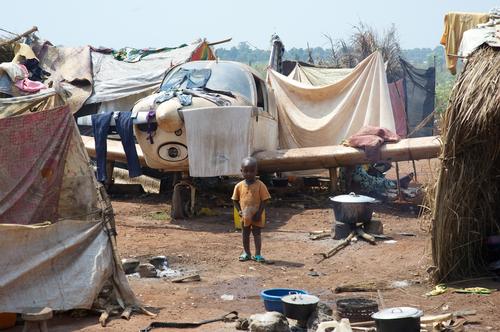In the year since the March 24 coup d’état in Central African Republic (CAR), violence and turmoil has increased significantly and continues to spread. Caught up in the chaos is a civilian population, vulnerable to the violence, starvation, and deadly disease.
An estimated 20 per cent of the population has been displaced, with many hiding in the bush or trapped in hospitals, churches and mosques. More recently, collective reprisal attacks against the minority Muslim community has caused them to flee the country en-masse.
Although a 12,000-strong UN peacekeeping force has been proposed to help secure lives, many civilians continue to pay the price of abuses committed by the ex-Seleka, the opposing anti-balaka militias, and criminal elements taking advantage of the unrest.
Médecins Sans Frontières (MSF) is working in many of those communities hardest hit, in areas like Bossangoa, Boguila and Bangui. Ronald Kremer, MSF medical emergency coordinator, has just returned from CAR.
How long has MSF been working in CAR?
MSF started work in CAR over ten years ago because of critical health needs and a lack of infrastructure. Looking back at this past year, I never expected that an already dire situation could deteriorate more. The levels of violence have been massive. There are thousands of people who can’t access clinics and hospitals, and those who fled their homes in fear and are still hiding in the bush, or in neighboring countries.
How vulnerable are minority communities now?
There are, for example, 1,500 Muslims left currently in Bangui’s PK12 neighborhood, surrounded by a hostile community who don’t want them in the country, or who wants them dead. Recently grenades and gunfire directed at them have exacerbated their fear. It is also a difficult place for us to work, but necessary because in one day we can do over 200 medical consultations.
Last week I was in Boguila, in northern CAR, where the violence has spread. In one short hour several people with gunshot wounds were brought to the hospital. A woman also arrived whose arm had been hacked by a machete. She did not cry or scream, but I could see the fear in her eyes.
There is so much fear within the population that they easily panic and flee their villages. Mothers take their children from the hospital and run into the bush. This is based on what they’ve all experienced in the past.
Just over a month ago I got a call from our medical team in Bossangoa telling me there were fifteen trucks evacuating the Muslims to a more secure place in Chad. People were pushing to get onto these trucks. They were very emotional, as was our staff. They said they didn’t want to leave since most had lived in CAR for generations, but had to leave for their safety.
What are some of the threats MSF is tackling?
Malaria is the number one cause of death. We also see skin diseases, respiratory tract infections, severely malnourished children and people suffering from gunshot, spear and machete wounds.
I went out with the mobile clinics to a village called Benzambe, which is north of Bossangoa. It is not an easy journey because you have to drive off-road. What struck me was how many members of the community came to the clinic to volunteer their help. While we were there, some war-wounded arrived, carried on the back of motorbikes.
One woman, in her early thirties, had traveled from where there had been an attack on her village. She had been shot in the stomach about 12 hours before. She was very sick, but still conscious. The longer you wait, the higher the risk of infection and complications. Luckily, we were able to transfer her and others, along with a medic, to the hospital in Bossangoa.
What are the biggest challenges for people moving forward?
I am very concerned about peoples’ mental health. I am talking about hundreds of thousands of people who have seen terrible things, lost family members and friends, and fled to the bush or to neighboring countries.
Malaria will increase dramatically when rainy season starts, and malnutrition is also a big worry. When people are displaced they can’t work on their fields, and a lot of the land has deliberately been ruined or burned.
Then there are those who managed to flee CAR – under grave danger – to Chad and Cameroon. MSF is trying to treat them there. But while they are in a safer place for the moment, the bigger questions start. What are they going to do for work? How are their children going to go to school? What are they going to do in a country that is not the one they consider home?



